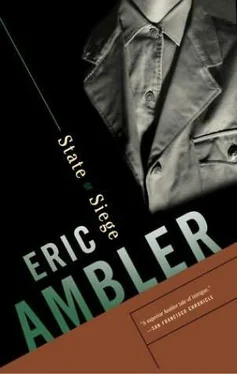Eric Ambler - State of Siege
Здесь есть возможность читать онлайн «Eric Ambler - State of Siege» весь текст электронной книги совершенно бесплатно (целиком полную версию без сокращений). В некоторых случаях можно слушать аудио, скачать через торрент в формате fb2 и присутствует краткое содержание. Год выпуска: 1956, ISBN: 1956, Издательство: Berkley, Жанр: Криминальный детектив, на английском языке. Описание произведения, (предисловие) а так же отзывы посетителей доступны на портале библиотеки ЛибКат.
- Название:State of Siege
- Автор:
- Издательство:Berkley
- Жанр:
- Год:1956
- ISBN:9780425067680
- Рейтинг книги:3 / 5. Голосов: 1
-
Избранное:Добавить в избранное
- Отзывы:
-
Ваша оценка:
- 60
- 1
- 2
- 3
- 4
- 5
State of Siege: краткое содержание, описание и аннотация
Предлагаем к чтению аннотацию, описание, краткое содержание или предисловие (зависит от того, что написал сам автор книги «State of Siege»). Если вы не нашли необходимую информацию о книге — напишите в комментариях, мы постараемся отыскать её.
State of Siege — читать онлайн бесплатно полную книгу (весь текст) целиком
Ниже представлен текст книги, разбитый по страницам. Система сохранения места последней прочитанной страницы, позволяет с удобством читать онлайн бесплатно книгу «State of Siege», без необходимости каждый раз заново искать на чём Вы остановились. Поставьте закладку, и сможете в любой момент перейти на страницу, на которой закончили чтение.
Интервал:
Закладка:
“And it will be ended by tonight?” she asked.
“Apparently.”
We looked at one another in silence for a moment; then she drew a deep breath and nodded.
“So.”
“Yes.” I picked up my towel. “I think that it’s about time I went and shaved.”
8
The shelling of the area around the Van Riebeeck Square began at one o’clock.
For three hours before that, insurgent troops had been straggling back from the forward positions and occupying the block of buildings which included the Air House and the Ministry of Public Health. On my way back from the bathhouse, I had looked over the balustrade and seen two more two-pounders being manhandled through the big doorway of the Air Terminal offices below, and a truck full of wounded being driven in the direction of the Telegraf Road. The only civilians to be seen were children. Some of them stood in awe-struck silence, watching the troops; others, bolder, were playing a war game round a bomb crater and jumping in and out of the fox-holes.
A little after eleven, there were several violent outbursts of firing. They seemed to come from about a mile away to the north. Immediately after the first one, the telephone in the next room began to ring. During the half-hour that followed, there was scarcely a moment when Sanusi or Roda was not on the telephone; but for most of the time there was such a lot of noise going on outside that, although I could distinguish odd words and sentences, I could not make sense of what was being said. Eventually, Sanusi and Roda went out on to the terrace, and there was a muttered conference over a map. If the bad news was beginning to filter through to them, they clearly did not want their staff inside the room to know too much about it. In the middle of the conference, Roda was called in to the telephone again; but Sanusi remained on the terrace, fidgeting uneasily with the map and staring down into the square. After a minute or two, Roda came back and there was another furtive discussion. Some decision seemed to come out of it, for in the end Sanusi nodded, and the two men turned and walked back inside. A few minutes later the radio was switched on, and I guessed that the staff had been left to their own devices.
The official communiqué was being broadcast at intervals of fifteen minutes, and part of it was similar enough to the one I had invented earlier that morning to make us both laugh. The rest was not so amusing, however. Six persons attempting to obstruct the movements of the National Freedom Army had been shot; twenty others had been arrested on suspicion of sabotage, and were being questioned. There was a warning that persons failing to obey orders promptly, or displaying reluctance to assist the National Freedom Army in its fight against the colonialist reactionaries who were attempting to defeat the will of the people, would be liable to summary trial and imprisonment with forfeiture of all property.
Rosalie began to worry about her sister and Mina. The fighting seemed to be moving towards the quarter in which they lived, and she was afraid that, in trying to get away from it, they would run into worse trouble when the Government forces began to close in from the east. We talked about it for some time, but I made no effort to reassure her; not merely because I knew that my reassurances would be worthless, but because I hoped that the more she worried about Mina and her sister, the less she would worry about herself.
A little after mid-day there were two extra-violent explosions that brought down some more fragments of plaster, and a few moments later we saw two columns of smoke mushrooming up over the warehouses in the direction of the old town. Rosalie said that one of the oil companies had their gasoline storage tanks in that area, but the smoke looked to me more like the result of demolition charges. I thought it probable that the defenders were now trying to delay the Government’s encircling movements by blowing up canal bridges, and wondered if they yet knew that there were enemies, not friends, waiting across the line of their retreat.
I did not have to wait long for the answer. During the morning I had found a pack of cards in a drawer of Jebb’s belongings, and at intervals since then I had been teaching Rosalie to play gin rummy. We had just sat down to resume our interrupted game when there was a sound of movement from the next room and the radio was switched off. Sanusi and Roda had returned.
For a few minutes, there was a steady murmur of voices punctuated by sharp monosyllables from Roda. Suddenly, chairs grated on the tiled floor and a door closed. Then, footsteps sounded on the terrace, the curtain was pushed aside, and the staff captain whom I had seen the previous day on the floor below peered in at us.
I looked up, and he beckoned.
“You, come.”
“Where to?”
“See Boeng.”
My heart was beating too insistently for comfort; but, for Rosalie’s benefit, I put my cards down with a sigh of irritation and a word of apology before I stood up.
“You, come.” He was belligerent now.
“I am coming.”
I walked out on to the terrace and, with his hand on his pistol, he stood aside to let me pass. I took no notice of him and walked along to the living-room windows. There was no glass in them and I could clearly see the four men inside. Apart from Sanusi and Roda, there were a major and a lieutenant-colonel, both of them grey with dust and wearing steel helmets.
As before, it was Roda who took the initiative. He beckoned me in. The captain followed and stood behind me. Sanusi was sitting on the side of one of the long chairs, staring at the floor. He took no notice of me.
Roda glanced at the other two. “It was this tuan who repaired the radio power generator when a bomb damaged it yesterday. He is an engineer from Tangga.”
The lieutenant-colonel nodded absently. The major stared. Sweat had caked the dust on their faces and their eyes were swollen with fatigue.
Roda stood up. “Mr. Fraser, you will answer some questions. Some of the answers we already have, so that we shall know whether you tell the truth or not. So, be careful.”
I said nothing and waited.
“Have you seen Major Suparto today?”
“Certainly I’ve seen him.”
“When?”
“I think it was shortly before the General and you came up here, nearly an hour after the planes came over that dropped leaflets.”
“Where did you see him?”
“Here, naturally.”
“What was said?”
“He told me that the General was returning to this apartment, and that I should respect his desire for privacy by keeping off the terrace outside.”
“What else?”
“He allowed me to fetch some drinking-water from the kitchen.”
“What else?”
“Nothing more, I think. Oh yes, he mentioned that he was going to make a reconnaissance in the city.”
Roda laughed shortly. Inside the room there was a silence. Not very far off, an eighty-eight was slamming away like a pair of double doors in a gale.
Sanusi raised his head. “Was nothing else said, Mr. Fraser?”
“No, General.”
“Why should he tell you where he was going?”
“I’ve no idea, General.”
“You knew Major Suparto when he was at Tangga. Were you friendly with him there?”
“Not particularly. He was employed by the contractors as a liaison manager. His duties were very different from mine.”
“What was the opinion of Major Suparto at Tangga?”
“Very high. In fact …” I broke off.
“Go on, Mr. Fraser. Say what there is to be said.”
“I was only going to say that Major Suparto was exceptional. The Government sent quite a lot of unemployed officers to work with us there. Major Suparto was the only one of them who had any real ability.”
Читать дальшеИнтервал:
Закладка:
Похожие книги на «State of Siege»
Представляем Вашему вниманию похожие книги на «State of Siege» списком для выбора. Мы отобрали схожую по названию и смыслу литературу в надежде предоставить читателям больше вариантов отыскать новые, интересные, ещё непрочитанные произведения.
Обсуждение, отзывы о книге «State of Siege» и просто собственные мнения читателей. Оставьте ваши комментарии, напишите, что Вы думаете о произведении, его смысле или главных героях. Укажите что конкретно понравилось, а что нет, и почему Вы так считаете.












